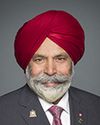Well, we were happy to hear that we are getting transitional funding for the next year from the federal minister and from the Public Health Agency, but it is a band-aid reaction to the cuts that are happening. There's a change, a shift, and the landscape is changing, but it should not be to the detriment of people living with HIV. That's our stance. That will be our stance in our advocacy, and I'll be moving forward to get full funding for 2018 and increasing the funding to the community action fund, which will be pro-rated, with maybe an injection of more funds to our countrywide efforts against HIV.
The front-line services, which do prevention, treatment, and support work on the front lines, are the most affected by this funding cycle. Also, because we're focusing only on prevention for people who are HIV negative, for everybody who is living with HIV, it's about making sure that they stay undetectable, because we know now, with science, that people who are on their medication become undetectable and cannot transmit new HIV cases down the road. It's imperative, in the 90-90-90 approaches with UNAIDS, that we have a holistic approach to how we do prevention of HIV. We believe strongly that this is missing in the Canadian effort with the new funding cycle for community organizations.
That's what we'll be lobbying and going towards. I think that if we maintain a holistic approach to fighting HIV on all levels, it will ultimately be better for all Canadians, because we will reach zero transmission by 2030 if the money is put towards getting to that.




